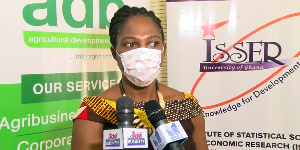 Dr Vera Fiador, senior lecturer at the Department of Finance of the University of Ghana
Dr Vera Fiador, senior lecturer at the Department of Finance of the University of Ghana
•The financing module of the DBG must not override its commercial interests
• A senior lecturer at the Department of Finance of the University of Ghana called for the need for banks to be financially sustainable
• The DBG is expected to run on a financing module to provide lending support to key growth sectors
Despite the social mandate of setting up the Development Bank Ghana to provide patient lending support to key sectors of the economy, it is important for the bank’s social financing module not to override its commercial interests.
This is according to Dr. Vera Fiador, a senior lecturer at the Department of Finance of the University of Ghana.
Explaining her reasons, she points that investments drawn from the bank must be financially sustainable to foster its mandate.
Making her submission at a development dialogue organised by the Institute of Statistical, Social and Economic Research (ISSER), Dr Fiador said, “We understand the bank, being a development bank, would have some social interest so that it is able to provide patient capital for industries that will not be attractive to traditional commercial banks, but the decisions must not override the commercial interest.”
Though Dr Fiador backs the idea of setting up the development bank which comes with lending support, the senior lecturer added “it is the ideal thing to avoid a mission creep or drift” from its mandate.
Meanwhile, a former Vice Chancellor of the University of Ghana-Legon, Prof. Ernest Aryeetey, on his part has cautioned against political and civil interference in the establishment and operations of the National Development Bank.
According to him, the bank must run autonomously to serve its intended purpose of lending to critical growth sectors of the economy.
Prof. Aryeetey said lessons must be learnt from previously established banks that failed as a result of poor corporate governance structures and political interference.
“If Parliament wants to control the Development Bank, it will fail. If civil servants want to control the bank, it will fail. If individual businesses want to control the bank, it will fail. We need to craft a governance system that takes into account all the above interests and still remain independent,” Prof. Aryeetey earlier said.
The former UG Vice Chancellor pointed the DBG will survive if it adopts stringent corporate governance structures and runs independently but wants a broader conversation on organizational arrangements to address risks associated with long-term financing in Ghana.
The move to set up the Development Bank Ghana was first announced in Parliament by the Finance Minister, Ken Ofori-Atta in 2019.
Most recently in May this year, Ghana secured recently secured a €170million facility from the European Investment Bank for the establishment of the Development Bank of Ghana (DBG).
The DBG is expected to help address two important constraints in the country’s financial system: namely, lack of long-term funding, and the lack of adequate funding to productive sectors of the economy.
The banks’ primary focus areas will be agribusiness, with a focus on off-farm value-chain activities, manufacturing, ICT, software; and allied services including Business-Process Outsourcing, tourism, and boosting home ownership through affordable and longer tenure mortgage finance.